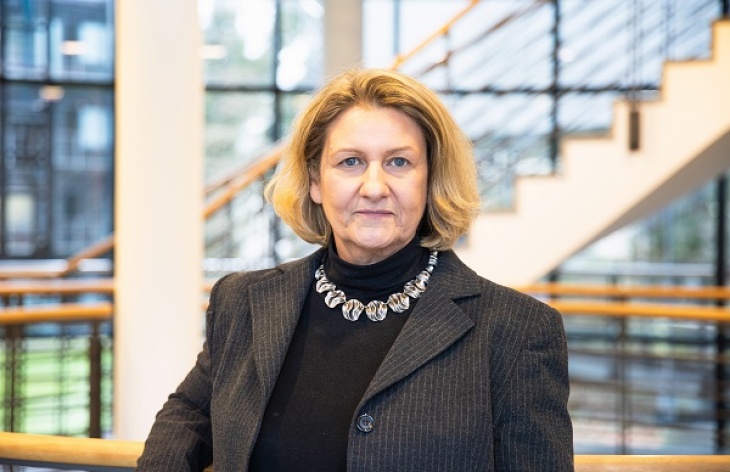New UNESCO Chair in Hamburg
Joint press release of the German UNESCO Commission, Universität Hamburg and the Helmholtz-Zentrum Hereon
UNESCO and Universität Hamburg have now created the UNESCO Chair “Societal Climate Research and Resilience”, headed by Hereon coastal researcher Prof Beate Ratter. This marks the 17th UNESCO Chair in Germany dedicated to implementing the global sustainability agenda. Through their efforts, the Chairs promote and expand collaboration with universities, research institutes and societal actors in the countries of the Global South, Germany and Europe.

Prof Beate Ratter is looking forward to the very varied new task. Photo: University of Hamburg/ Gölling
“Climate change is a threat to all life on our planet,” underscores Prof Maria Böhmer, President of the German UNESCO Commission.
“Technology alone won’t stop it; rather, we have to recognize that climate protection is a task for society as a whole. I’m pleased that, from now on, excellent Hamburg-based researchers will address these topics as part of the international UNESCO Chairs network. They will bring us one step closer to meeting the sustainability targets set by the United Nations.”
Asking questions about sustainability
Active climate protection includes sustainability questions, adaptation strategies and disaster preparedness. How individuals and communities respond to the challenges posed by climate change differs from region to region and is also subject to cultural influences. The new UNESCO Chair plans to intensify research into the various roots of human resilience and apply the insights gained to climate protection. The researchers will particularly focus on small islands in the Caribbean, Indian Ocean, Pacific, North America and Europe, which are among the hardest-hit by the impacts of climate change.
“We have to shift from knowledge to action. That’s a transition that I want to actively promote,” says Prof Beate Ratter, geographer and head of the newly formed UNESCO Chair of Societal Climate Research and Resilience in Hamburg. “In this regard, my focus will be on small islands. Based on the needs and problems faced by the local populace, my goal is to foster a sense of their own ability to make a difference. In the long term, this can facilitate the formation of structures that allow them to independently and sustainably respond to the challenges posed by climate change,” says Ratter. Moreover: “UNESCO is a fascinating peace organization that works to advance knowledge, justice, education, culture, empowerment and equality. Accordingly, the UNESCO Chairs reflect a tremendously broad range of expertise, which I hope to combine in connection with climate-change adaptation. After all, climate change isn’t an isolated phenomenon; it affects all aspects of our lives and will continue to do so.”
Great appreciation for her work
Since 2017, Beate Ratter has been a Professor of Integrative Geography and Coastal Research at Universität Hamburg’s Institute of Geography and a researcher at the Cluster of Excellence for climate research “Climate, Climatic Change, and Society”. In addition, she heads the Human Dimensions of Coastal Areas Department at the Institute of Coastal Systems, Helmholtz-Zentrum Hereon in Geesthacht.
“On behalf of the University, I congratulate Prof Beate Ratter on receiving this honor. We’re pleased that the University will now be home to the Chair of Societal Climate Research and Resilience. Research into human/environment interactions and the social prerequisites for lasting decarbonization are also focus areas for our Cluster of Excellence CLICCS, which addresses precisely such questions,” says Prof Dr. Hauke Heekeren, President of Universität Hamburg.
Prof Matthias Rehahn, Scientific Director of the Hereon, says: "Prof Ratter has also proven at the Hereon over the years that she can not only research fundamental findings on climate change, but also develop solutions and recommendations for action. She also has empathy and a good connection to the people who are suffering from climate change, for example on islands in developing countries. I warmly congratulate her on this chair."
Background
In a global network, more than 900 UNESCO Chairs in more than 110 countries are working to embed UNESCO’s goals in research and education. There are 17 UNESCO Chairs in Germany, all of which stand out for their excellent research and education in UNESCO’s focus areas. The guiding principles for their work include international networking, especially between the Global North and South, and promoting intercultural dialogue. Around the globe, the UNESCO Chairs work to generate, disseminate and apply new knowledge in order to advance sustainable development.
Further Information
Website UNESCO Website Universität Hamburg, Interview with Prof Beate Ratter Website Hereon- Institute of Coastal Systems - Analysis and Modeling
Contact
Press Spokesperson
Deutsche UNESCO-Kommission
Phone: +49 228 604 97-142
Cluster of Excellence, CLICCS (Climate, Climatic Change, And Society)
Universität Hamburg
Phone: +49 40 42838-7596
Press Officer
Communication and Media, Helmholtz-Zentrum Hereon
Phone: +49 4152 87-1648
